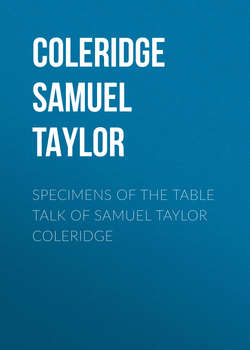Читать книгу Specimens of the Table Talk of Samuel Taylor Coleridge - Coleridge Samuel Taylor - Страница 13
TABLE TALK
May 8. 1824
ОглавлениеPLATO AND XENOPHON.—RELIGIONS OF THE GREEKS.—EGYPTIAN ANTIQUITIES.– MILTON.—VIRGIL
Plato's works are logical exercises for the mind. Little that is positive is advanced in them. Socrates may be fairly represented by Plato in the more moral parts; but in all the metaphysical disquisitions it is Pythagoras. Xenophon's representation of his master is quite different.18
* * * * *
Observe the remarkable contrast between the religion of the tragic and other poets of Greece. The former are always opposed in heart to the popular divinities. In fact, there are the popular, the sacerdotal, and the mysterious religions of Greece, represented roughly by Homer, Pindar, and Æschylus. The ancients had no notion of a fall of man, though they had of his gradual degeneracy. Prometheus, in the old mythus, and for the most part in AEschylus, is the Redeemer and the Devil jumbled together.
* * * * *
I cannot say I expect much from mere Egyptian antiquities. Almost every thing really, that is, intellectually, great in that country seems to me of Grecian origin.
* * * * *
I think nothing can be added to Milton's definition or rule of poetry,– that it ought to be simple, sensuous, and impassioned; that is to say, single in conception, abounding in sensible images, and informing them all with the spirit of the mind.
Milton's Latin style is, I think, better and easier than his English. His style, in prose, is quite as characteristic of him as a philosophic republican, as Cowley's is of him as a first-rate gentleman.
If you take from Virgil his diction and metre, what do you leave him?
* * * * *
18
See p. 9. n.—ED.
